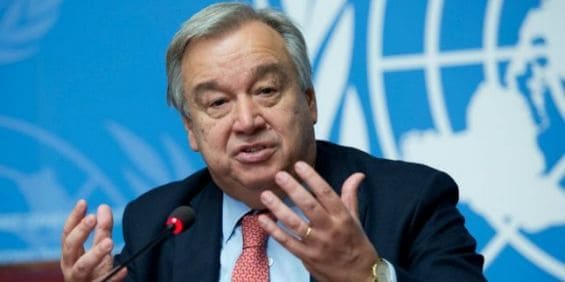“Our world faces a common enemy: COVID-19.” When UN Secretary-General Antonio Guterres appeared on televisions across the world on Monday, March 23, his tone was solemn.
“The virus does not care about nationality or ethnicity, faction or faith. It attacks all, relentlessly,” Guterres continued as he urged warring parties around the world to establish a global cease-fire in order to address the novel coronavirus pandemic.
Guterres reminded millions watching from self-isolation at home that “the most vulnerable—women and children, people with disabilities, the marginalized and the displaced—pay the highest price.”
The Secretary General urged a general worldwide ceasefire to allow for humanitarian aid and crucial measures to fight the outbreak of COVID-19, especially in conflict areas where healthcare systems have collapsed.
“To warring parties, I say: Pull back from hostilities. Put aside mistrust and animosity. Silence the guns; stop the artillery; end the airstrikes. This is crucial…to help create corridors for life-saving aid. To open precious windows for diplomacy. To bring hope to places among the most vulnerable to COVID-19.”
The UN’s public statement set the goal. Now leaders of warring parties have a specific choice to either continue the onslaught, or heed the call of peace.
Libya
On Tuesday, March 24, the Bill & Melinda Gates Foundation warned that the United Nations High Commission for Refugees (UNHCR) is suspending activities in Libya. Resettlement flights for refugees have been halted globally and NGOs are powerless to stop any harm from being inflicted on refugees and civilians.
Residents of Tripoli are under lockdown, but the UN-backed Government of National Accord has a limited sphere of influence, which means the measures should have little effect on the spread of the virus in the country at large.
On Saturday, March 21, the United Nations welcomed positive signals from both warring parties.
UNSMIL welcomes the positive responses by GNA & LNA to the calls for of a humanitarian pause, & hopes that they stop the fighting immediately to allow national health authorities and other health partners to respond to the potential threat of COVID-19 https://t.co/k4PKANlTva
— UNSMIL (@UNSMILibya) March 21, 2020
London-based publication Al-Awsat reported on Tuesday, March 24, that both parties are trading accusations, giving little hope for a sustainable ceasefire. Four Turkish soldiers and one Syrian mercenary were killed in the preceding days, and Tripoli’s airport continues to face artillery fire. Anadolu Agency reported two further civilian casualties on the same day.
Syria
In Syria, the iNGO International Rescue Committee warned on Monday, March 23, that the country “could soon become one of the most severe outbreaks in the world.” The Idlib province, where fighting between Turkish and Russian aligned forces has complicated an already opaque struggle between pro-Assad forces and a variety of militias, is at particularly dire risk.
The country has confirmed its first case of the novel coronavirus, and the Kurdish administration that controls northeastern Syria has announced a lockdown. Cooperation with the WHO has been difficult, reports Al-Monitor.
In an encouraging move, the Associated Press reported that on March 22, Syrian president Assad met with Russia’s defense minister to discuss “enforcing the cessation of hostilities in the Idlib de-escalation zone.” undoubtedly in part related to the coming COVID-19 outbreak in Syria.
Yemen
Widely considered the worst conflict area in the world, Yemen’s few remaining intact healthcare facilities are struggling to provide basic healthcare, let alone effective COVID-19 responses. Independent information provider ACAPS reported that only 51 percent of health centers are fully functional, with limited medicine and personal protective equipment for healthcare workers.
With over 3.6 million internally displaced people and at least one million of those people living in camps or informal settlements, information is hard to share and the country’s healthcare system is not ready for COVID-19.
Anadolu Agency reported on Tuesday, March 24, that Houthi rebels have welcomed the call for a humanitarian cease-fire. The World Health Organization (WHO) increased supply distribution to Yemen and raised the country’s alert level. WHO Director General Ghebreyesus also commended Saudi Arabia for airlifting COVID-19 response supplies to Yemen.
Special thanks to Saudi Arabia who airlifted critical @WHO #COVID19 supplies to #Yemen, including personal protective items for health workers & lab screening tests for Aden & Sana’a. The shipment also incl. trauma meds & supplies to support the ongoing response to the crisis. pic.twitter.com/g9zzorMAkv
— WHO EMRO (@WHOEMRO) March 23, 2020
Parties have yet to guarantee a No cease-fire, has yet been guaranteed, and Yemen and Syria appear to signal moves to stop the fighting. Let’s hope that the UN Secretary General’s call for a temporary halt in violence could create something rarely seen: Temporary but complete peace on Earth. In the words of Antonio Guterres, “That is what our human family needs, now more than ever.”

